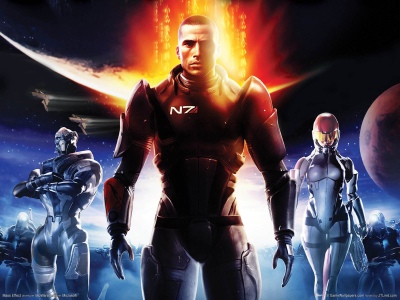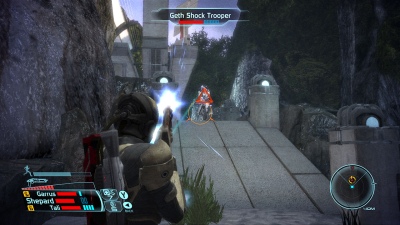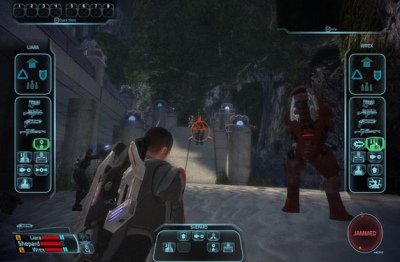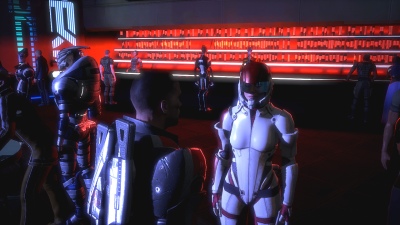
RPG's are a hardcore gaming favorite. They take a long time, require some thinking (well, most of the time), and can be very enriching experiences. However, I've been feeling that RPG's have been on the stale side lately. I've played some decent RPG's recently and enjoyed them, but I haven't had a truly epic experience with one in a good long time. However, I never stop looking for that next new treasure whether it be new or old. I decided to start a game in the original Mass Effect due to all of the attention its sequel was garnering by consumers and critics alike. I had my copy left unopened since 2 Christmases ago and I honestly didn't think to play it until I forced myself to buy a copy of the sequel's Limited Edition package (hey, I may not know if I even like the series, but I'm a sucker for awesome packaging). A few months later, I've beaten both games and I have to say without exaggeration that they are some of the best games I have ever played. They have surpassed my expectations by far not only as RPG's, but as games and works within the Sci-Fi genre. Read on to find out just why I love them so much and why I think they are important to the future of RPG's and gaming in general.
One thing about RPG's that always bothered many gamers over the years is how they player seemed to be in control of their characters' actions, yet not their destiny. There was always an element of luck in the equation, that random attack or defense value, that turned some people off from the genre. You'd constantly hear from frustrated gamers, "How come I can't dodge that attack!" and "Why did I die if my stats are greater than the enemy's!" These die rolls were a necessity born from the Dungeons and Dragons battle system. This element of luck brought excitement to some people, never knowing if fortune would find their favor or their enemy's. However, because the success of an attack or defense maneuver only relied on on dice roll, your character could very well miss the enemy entirely for seemingly no reason and with disastrous results (Fire Emblem is quite possibly the worst offender in this regard, going as far as to SAVE unfavorable die rolls after a continue, promoting the destiny comparison even further).
This luck factor was a concession, a haphazard gene in the RPG genetic makeup, that players craving more out of their games had bear in order to play a game more than a couple hours long. It wasn't too long ago that getting 20 plus, or even 10 plus, hours of progressive gameplay was not a possibility. RPG's were there to tell a story and show progression of a character from Fighter to Knight in addition to their respective plots. The luck system was the best way the game creators could simulate action while still being able to keep the complexity that adventurers craved.
By now we've had many action RPG's before. This hybrid is nothing new to those of us that explored the lands of Hyrule and Ys. The adventure game was a median, a rare haven, for those that craved the length and growth of the RPG and kinetic satisfaction of the action game. However, these games always felt slanted towards the action side. Of course, this style-blended genre varies in how close it gets to the "pure" RPG, but the majority of successful titles in the genre stay away from the RPG side. The more RPG-like the adventure game became, the more cumbersome the game became, notably when the game was single-player and on a console.
Probably the earliest console adventure game with heavy RPG elements (experience levels, magic, and a party) that grasped gamers' hearts was Squaresoft's Secret of Mana. This game essentially was like any common turn-based RPG at the time with the exception of two things: the optional 3-player interface and the action-based battles. The action, however, felt decidedly too much like an RPG with cool-down after every sword swing. Many players had no problem with this design decision as they were happy simply to have a game that had the elements of the RPG they loved but with a new formula. Other players thought, though, that the cool-down made the combat cumbersome. It made them think, "I could swing a sword several times in a row and not be tired. Why do I have to wait a 2 second break in-between each swing?" What the game's battle system then essentially boiled down to an RPG with moving and attacking on-demand rather than a menu-based, almost third party, control as the game took control of the character's actions for you after the menu input.

I was not satisfied with this model. I always felt like as though if you bogged an action game with too many RPG elements, they just made the game awkward. Secret of Mana is not a favorite game of mine, and considering that fans choose it as one of the best in the series, I've had no urge to play any of the others and will likely continue that tradition as I've given the game a fair shot several times in both single-player and three player modes. However, I have not given up on the prospect of finding a game that performs that series' philosophy well.
With the coming of a deluge of AAA titles released in succession, I've picked up many of these titles as a kind reminder to get myself to complete my monstrous backlog, which I seriously doubt I could EVER complete even half of. It seems as though sequels are many times the only reason why I start on a game that I've postponed playing for over a year. Late as usual, I've finally discovered the beauty that is Mass Effect while everyone else has promptly moved onto the new-shit sequel and found that it is exactly what I've always wished Secret of Mana was like. In many ways I enjoy playing a game after shine has dulled a bit because at least I know I'm not a starry-eyed school boy in saying how awesome this game is.
The game is the way RPG's have always aspired to be. Your avatar is an interesting character. This factor alone is a tough aspect for almost any story in general, let alone a movie or video game. Heck, most of the time RPG's rely on the age-old cop-out: the silent protagonist. You are a dude. A good dude. That gets the girls for no discernible reason and save the world without uttering a syllable (no small task, mind you, with interacting with tons of NPC's and all). No doubt about it, this ancient convention is tiring and decidedly lazy on the developer's part. That is not to say I do not love me some Chrono Trigger and the like, but those games are more about the supporting characters as a result of the confounding design decision. The truth is that silent protagonist is the designer's weak attempt at emersion. This avatar is supposed to represent the player. However, rather than having the character be able to interact with the characters in a verbal way, most designers allow the entire story to happen around the character rather than depending on him. I experienced this phenomena last night, in fact, while playing Ys: Oath in Falghana (aka the PC remake of Ys III: Wanderers from Ys). In the grand abstract literary theoretical sense, Adol exists in that game to fix wrongs. He is not a integral character in the story but rather a tool that the designers use to right the wrongs in the world that they create. He mends the broken world so it may function once again. When his work is done, he leaves the land in search of a new adventure (or in this case two separate adventures on two different systems). This trope is the hero's famous condition, well-used by greats from Sergio Lione and Homer. The heroes sculpted by these wordsmiths only exist to rid the world of evil then promptly ride off into the sunset once the job is done. The heroes are mostly complex, though. They experience heartbreak and loss. The silent protagonist in video games serves only as the function of the hero, only the tool aspect, and does not take up his responsibilities as a character. In Oath in Falghana, for instance, the entire story in the game could very well happen without Adol. He has absolutely no bearing on the emotions of the other characters around him. In one scene towards the end of the game, Chester and Elena talk about their past together while Adol sits in the background likely falling asleep with his eyes open. Chester and Elena interact and grow with each other, with Adol only serving to kill things so they can get to that point. Now I love this game for a lot of reasons, though the story would clearly benefit by actually giving poor mute Adol a personality so he can actually woo to his damsels and smack talk lame-named antagonists.

Now, in terms of dialog, I simply want the protagonist to be a part of the game. Mass Effect, though, satisfies me in aspects of storytelling more than any other game I've ever played. I realize that dialog trees are nothing new to games. They have been the best way for game designers to give the player some input on the story of the game. If you have no input you are simply reading the dialog, observing it, not participating in it. If you allow the player to type ANY response (ala Infocom games), the game will be lost with your tone, with the game only recognizing key words like "microwave" and "hamster" with no way of detecting sarcasm or malice. With dialog trees, players can take an active roll in how the characters around their avatar react to the things they say. The tree is not necessarily what I would call non-linear, as you don't have the option to say anything you want (and you wouldn't want to in this case) and they certainly are not linear as you have choice. This method of story conveyance is instead multi-linear. Until games can actually simulate the human experience within a fantastical situation, designers choosing this method have since been most successful in providing a good story with many paths to take. Mass Effect takes that concept one step further through its extensive voice acting. Not only does you main character have several choices in hundreds of conversations throughout the game, but they are all voiced by a male or female (!!!!!!) version of the character. I have never encountered a game with this much case sensitive voice acting and it really makes the game stand out among all of its contemporaries.
Another thing that I've found that BioWare has done is make the game episodic. I don't mean episodic in the Half-Life and Sam & Max sense, but episodic just like a TV show is structured. You have your over-arching plot, the continuity generating thread, which is the search for the enemy Saren. However, each planet has its own story that unfolds as you explore it. One planet specifically impressed me. This planet's description you find out that humans have made several attempts to colonize the planet unsuccessfully because their satellites mysteriously fall out of orbit. Upon exploring the planet's surface, you find that a group of space pirate had set up a jamming station that was causing all of the satellites to crash, littering the surface with their debris and salvageable technology. Without reading the text blurb before landing on the planet, you wouldn't realize that this planet had a story, just random space pirates. This subtlety is part of what makes the game so wonderful. It avoids simplifying the story for the player even with a small instance like this one.
Mass Effect took this stance toward emersion by adding one more factor to the equation: realistically populated environments. The first game had a surprising amount of active NPC's interacting with each other with the player able to overhear a conversation between two NPC's without interaction from the player. One such memorable interaction in the first game involved a situation involving a turian security officer in Site 45. When you meet him to start a mission, he tells you his last name is unpronounceable. I mostly ignored that conversation thread initially interpreting the dialog line as a slightly light-hearted comment. However, if you explore the area you find non-interactive NPC salerian having a video phone conversation. If you stay long enough, you hear him talk of that same turian you allied yourself with, along with the revelation of his herculean umpteenth syllable surname. While funny, this dialog is an important touch that Mass Effect retains. These touches apparate life into an otherwise typical RPG NPC area. These NPCs cease to be video game characters and are more like real people as their actions and conversations are not contingent on direct interaction of the player (of course the game doesn't run these NPC conversations if your character isn't near-by, but why would you care about tree-falls-in-a-wood dilemmas in this game?).

Mass Effect 2 took that non-interactive NPC conversation idea and took it one length further. Not only do the NPC's have conversations on their own that you may overhear, but choices open in the game based on the information overheard in the conversation. In one particularly fantastic instance, you can overhear two krogan debating whether the lake in the Citadel contains fish or not. After hearing the conversation, you can actually ask the groundskeeper in the club whether the one krogan's theory had any truth. You can actually head back to the krogan and tell them the truth for hilarious commentary (and a few Paragon points to go with it). More and more Bioware is giving us a world that seems real, or at least as real as you'd want an over-the-top sci-fi game to be.
The scribes of Mass Effect 2 enjoy the world they created. Much of the first game was introduction to the races and the second is where the writers have mastered how the new races relate to humanity, deciding what facets of humanity helped them define these new races. The interactions with the other races can now be both funny and compelling. I even found myself finding endearing traits of all of the characters around me. One big problems the sci-fi/fantasy genre has always had a problem with is that too many of the characters within a race are only representative of their race's generalized traits (any elf is entirely too similar to every other elf). However, in Mass Effect 2, the writers individualized each NPC with which you can interact. This individualization was a goal of the writers of the game as indicated by a dialog string on Tuchanka with a Krogan mechanic. He expresses that though krogan are seen as a warrior race, they still need doctors, scientists, and all the other specialists that any modern race would need. He even comments on how silly it would be if the krogan had to rely on the engineering-savvy quarians to fix every piece of broken machinery. The trend of sci-fi should be to move away from representing homogenized cultures because culture is varied by definition (the same could be said about one-environment type planets like the total desert of Tatooine, but that's a different argument altogether).
To be honest, The Mass Effect games are the first western RPG's I've ever beaten because I didn't enjoy the western story-telling style. However, if western RPG developers continue to follow the lead of the storytelling methods that BioWare cultivates, gamers can expect RPG's to be fun and new again, a feeling I personally haven't felt since Skies of Arcadia way back on the Dreamcast. A renaissance for western RPG's is past the precipace and flaunting its innovation. With any luck, the Japanese developers are observing and preparing a counterattack, a vengeance from which gamers can only benefit.

I certainly agree in regards to the thoughts on a silent protagonist. I love when the guy I'm playing as has a personality.
ReplyDeleteAnother good example is The Witcher. Geralt is fully voiced, and he has a personality; even if you decide most of it through your responses, his voice(and the fact that he has one) allows every choice you make to have character.
The Witcher is a game that I've wanted to play for a while now. For a time, I was waiting for the console version to come out as it was supposed to have an updated engine and such. That port is unfortunately dead now so I picked up a copy of the Enhanced Edition of the game for PC. I played only a half-hour or so and I really enjoyed it. I'll have to go back to that one...
ReplyDeleteI, too, agree with your thoughts on silent protagonists. Even though I love the Suikoden series dearly, it has always bothered me that the main character remained silent (except for 3, Tierkreis and the Suikogaiden games; not sure about Tactics). However, back in the olden days, this was tolerable since the characters around you would usually have conversations among themselves, with your opinion on things being implied. They didn't talk to you, the talked "around" you, if that makes any sense.
ReplyDeleteCue Dragon Age: Origins. I had a friend of mine show that game to me, and I was incredibly put off by the fact that it has silent protagonists. Just like in Mass Effect, there's a lot of one-on-one talk, where whoever you talk to looks straight at you while he or she talks. You, however, only choose text; no voice acting whatsoever. In other words, you're basically listening to what sounds like a monologue with missing parts. Personally, I found this absolutely terrible.
Also, I'm sure this has been pointed out in several comments that still await approval and thus haven't shown up yet, but it's "Saren" (not "Seran") and "turians" (not "taurians"). Gotta know you ME lore! ;)
^That's why I love Suikoden III.
ReplyDelete(That and Chris is a contender for the best female protagonist ever)
The balance between "action" and "RPG" is a delicate one. Most of the old Princess Crown/Odin Sphere article I wrote a few years ago talked about them, because I don't think either game did it particularly well. ME1 was servicable in this regard but ME2 really stepped it up.
ReplyDeleteAs for Ys, Elena falls for Adol at the end of the game so he technically has an effect on her emotions...but she falls for him more because his role as a "tool", or perhaps given Adol's state as an avatar, is meant as wish fulfillment for the player.
My favorite random bit of NPC dialogue was at a bachelor party for a salarian, where he swears that the rules of attraction for his race are totally different and just doesn't understand the appeal of the Asari dancing on his table, whereas the human and turian suspect him of BSing.
My issue with ME2 over ME1 was the fact you just frankly don't _do_ anything in the game. The overarching plot has almost zero progression and basically nil to do with what goes on.
ReplyDeleteThere's so many characters with so many quests and subquests and loyalty quests that you spend, I'd gather, over 75% of the game doing THINGS NOT RELATED TO THE ACTUAL PLOT.
If you strip the actual, entire game down to the non-sidequest bits you end up with:
(Trying to avoid spoilers as much as possible, here. Doing my best.)
[Initial Escape] - [First Exploration] - [Recruit Scientist] - [Next Exploration] - [Obtain F/F System] - [Ship Event] - [End Mission]
And that's it. 7 "missions", one that hardly counts in my opinion. Everything else, EVERYTHING, is sidequesting.
That's the feeling I got upon completing the game. "Wait...that's it? I didn't actually DO much but recruit and loyal-ize people."
@Dragoonkin:
ReplyDeleteI understand where you're coming from, but then again, ME1 didn't have that many "main" missions either. Eden Prime, Citadel, Feros, Noveria, Virmire, Ilos/grand finale.
I have a problem with the Mass Effect series. I think they are extremely interesting games and that I've actually completed them is a testament to their strengths, I just don't find them to be great games. What is underneath the games is fantastic. The romance, branching dialog options and strong story make this series hands down the most interesting RPGs in games right now. I just had a problem with a lot of the game pieces.
ReplyDeleteI wrote an article on destructoid (link below) about the numerous issues I had with both games. While I felt my article was fairly simple, the responses following and my responses to those responses gave me a new found respect for what this series gives to gamers. I still refuse to praise it as a game, but I respect it for what its doing differently.
http://www.destructoid.com/e-for-effort-the-mass-effect-series-so-far-170789.phtml
Also, some people were arguing about the structure compared to a TV or a movie and I agree with you above. Mass Effect had those side missions that felt like a Chuck or a Smallville with single episode arcs (the side missions) tied to a larger mission. Mass Effect 2 had a lot of missions that tied into the main mission ala Heroes.
Great article!
ReplyDeleteBut I thought that "Adventure" games meant stuff like Monkey Island and Discworld, not Zelda.
Adventure games are games that play like the Atari 2600 game "Adventure." It was a lengthy game for its time as it could take you hours to beat and it had no save battery. Essentially, the biggest expansion of that formula in the 8-bit days was The Legend of Zelda. So games that are similar to Zelda are seen as the best examples of adventure games. They are typically games that are not purely an RPG or an action game, but some sort of combination of both. These games have very differing formulas as to the mix of action and RPG. Zelda games, with the exception of Zelda II, are typically VERY light on RPG elements, to the point where the only thing they have in common is a lengthy quest and grinding for money. Other games, such as Secret of Mana, have heavy RPG elements with things like HP, MP, and a party. You may also have heard games like Secret of Mana called an Action RPG. The line between adventure and action RPG's is slim, if there is a distinction at all, and is heavily debated.
ReplyDeleteGames like Monkey Island and Discworld are "Point and Click Adventures." Some people may shorten the title of the genre to simply "adventure" because they are technically part of the genre (remember these games have a lengthy quest and story), just a more specific part.
Both Zelda and Monkey Island games are adventure games, it's just that when people want to talk more specifically about Monkey Island, they usually say "Point and Click Adventure" to avoid confusion.
At any rate, the Mass Effect games have both heavy ties to action games and RPG's, but really doesn't fit with either genre. It's not the same kind of game as Gears of War neither is it the same kind of games as Final Fantasy XII. It's somewhere in between. So the best way I've found to categorize the Mass Effect games is as an adventure game. Of course this distinction is debatable, as is all genre classification.